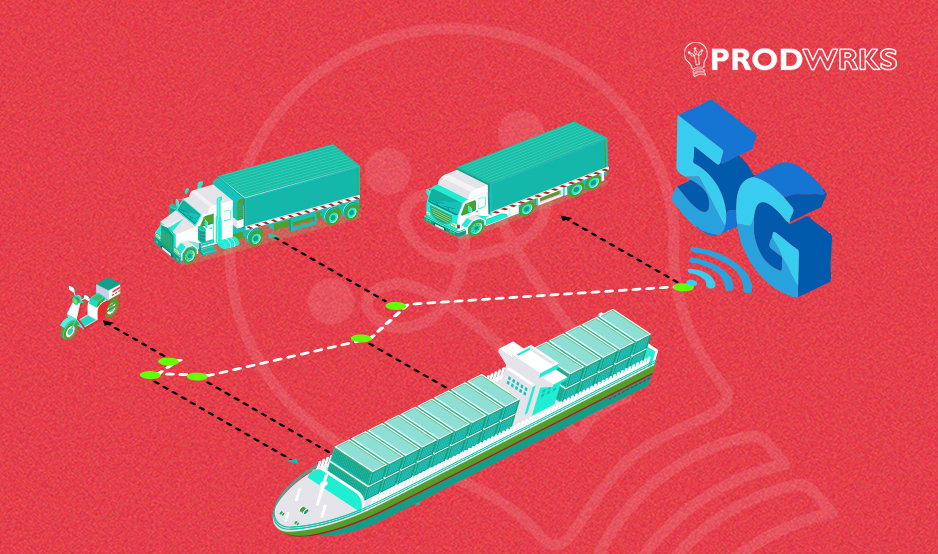
The author of this article, Pushpank Kaushik, is the CEO of Jassper Shipping.
By the end of 2023, the deployment of 5G technology is expected to completely transform the transportation and logistics sector. The fifth generation of cellular network technology, known as 5G, has several benefits over its forerunners, including increased capacity, quicker speeds, and less latency. This contributes to increased productivity, quicker turnaround times, and more customer satisfaction.
The ability of 5G to offer seamless communication between vehicles, enabling an increase in real-time tracking and monitoring of cargo, is one of its main advantages. This would enable quicker delivery times, better customer support, and end-to-end transparency.
Impact on Transportation and Logistics
- Fleet Management: The entire logistics and transportation industry can gain from it, and the fleet management procedure can be significantly improved. Fleet managers may now use real-time data to make cost and time-saving planning decisions owing to the development of 5G. Fleet management systems enabled by 5G also enhance customer service. Shippers may precisely predict delivery times by utilizing predictive analytics, automated tracking, and smart connection made possible by 5G networks. These tools also help shippers anticipate customer demands and improve route optimization.
- Asset Tracking: Businesses and service providers can readily benefit from improved connectivity through technology, which can give them more real-time insights about their assets. As a result, they will be able to manage their operations better, cutting costs and improving efficiency. By making it simpler to trace items as they move from one site to another, 5G networks’ increased speed improves supply chain management and ensures that goods get to their destinations quickly and safely. This not only cuts down on travel time but also improves data visibility. Finally, it can be used to monitor the health of freight and assets on the go. This ensures businesses identify future issues and make better maintenance plans.
- Last mile delivery: In the marine sector, the technology is enabling effective real-time tracking of ships, streamlining port and harbor operations, and accelerating delivery procedures. It is also assisting truckers in identifying dangerous roads and blind spot obstructions. It is possible by leveraging information obtained from streaming sensors directly connected to the truck. Technology is making deliveries quicker and more accurate, increasing the efficiency of logistics organizations, and enabling the automation of last-mile delivery.
Benefits to Consignees and Consignors
- By providing more precise tracking and coordination of shipments and resources, 5G also enables autonomous and remote-controlled vehicles. It can make it possible for automated or AI-driven systems to manage cargo, schedule delivery, track shipments, and optimize routes while reducing manual labor and raising cost-effectiveness.
- With regard to perishable items, 5G can be utilized to monitor their temperature, humidity, and pressure continuously. Using this information, the environment can then be altered to keep the items in their best possible condition. This makes it possible to maintain the quality of perishable commodities like food, medication, and plants during transportation.
- The 5G network’s flexibility makes managing documents, tracking payments, and developing new digital workflows easier. Additionally, businesses may explore blockchain technology to enhance the payment process, making it more dependable and secure.
- The 5G network may be beneficial for streamlining supply chain processes. In addition to 20x faster data speeds than 4G, 5G also has higher capacity and connected device limitations. Edge computing driven by 5G enables quick data transmission via cloud networks with minimal latency.
Impact on Supply Chain Management :
The implementation of 5G technology in supply chain management has the potential to revolutionize the industry in several ways. With increased connectivity and reliability, supply chain partners can seamlessly communicate and share information in real-time, leading to better coordination and collaboration.
The faster data transmission enabled by 5G enhances efficiency, allowing supply chain managers to quickly access and analyze large volumes of data. This, in turn, facilitates efficient decision-making and real-time adjustments in inventory levels, production schedules, and transportation routes.
Integrating 5G with artificial intelligence (AI) technologies further automates mundane tasks, optimizing supply chain processes and enabling autonomous decision-making. Real-time monitoring of assets, shipments, and inventory is made possible by 5G, providing enhanced visibility and security throughout the supply chain.
The ability to gather and analyze vast amounts of data from multiple sources using advanced analytics offers valuable insights into customer behavior, demand patterns, and performance metrics. This insight empowers proactive decision-making and targeted improvements in the supply chain.
Digitized Future of Logistics:
Multiple industries within the logistics industry use paperwork to maintain track of transactions, such as product shipping and receiving, inventory tracking, and supplier relationship management.
Companies utilize paper forms to record their contractual and legal duties linked to the supply chain. To validate any agreement, numerous legal documents are physically signed and delivered. To ensure effective freight operations and prompt delivery of goods, thorough records and freight papers are also documented.
5G technology enables connected IoT devices to significantly reduce paperwork across the board. Businesses may effortlessly access and share real-time data while securely streaming high-bandwidth applications for improved collaboration and communication by connecting diverse devices with a fast, low-latency network.
Real-time cargo tracking and monitoring can be enabled using 5G technology to better understand where each shipment is, making the tracking of shipments and verification of items clear and transparent. Smart contracts also help automate order processing and secure payment by allowing direct customer-vendor interactions, reducing the need for a third party to handle the transaction. This not only minimises the need for paperwork, but also speeds up, secures, and lowers the cost of transactions.
Both 5G and blockchain technology are becoming important drivers of innovation for the logistics and transport industry. Companies may boost productivity, lower customer expenses, and boost client satisfaction with quicker, more reliable connections, real-time monitoring tools, and autonomous car technologies.
By the end of 2023, 5G technology is likely to dominate transport and logistics, offering powerful capabilities that will be extremely beneficial to businesses. As 5G expands in this area, it will probably revolutionise the entire market by offering a platform with limitless options.
About the Author:

Pushpank Kaushik is the CEO of Jassper Shipping, a thriving international logistics company with a presence in various countries, including India, Singapore, and Dubai. He is now embarking on a new venture to expand operations in Netherlands and Mombasa and cover major ports in India.



